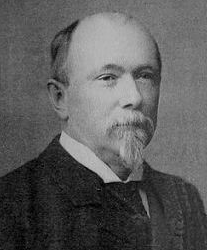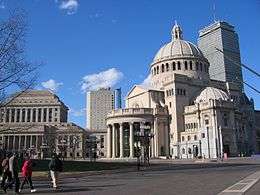Charles Brigham
| Charles Brigham | |
|---|---|
 Charles Brigham, 1907. | |
| Born |
June 21, 1841 Watertown, Massachusetts |
| Died | July 1925 |
| Nationality | United States |
| Occupation | Architect |


Charles Brigham (June 21, 1841 – July 1925) was an American architect based in Boston, Massachusetts.
Life
Brigham was born, raised, and educated in Watertown, Massachusetts schools and graduated at age 15 in 1856 in the first class of Watertown High School. He had no formal education in architecture.[1]
He apprenticed to the Boston architect Gridley J.F. Bryant. Brigham served as a sergeant in the Union Army during the American Civil War, then began work for John Hubbard Sturgis. His 1866 partnership with Sturgis lasted 20 years, and resulted in the original building for the Museum of Fine Arts, Boston.
Brigham subsequently designed the 1898 annex to the Massachusetts State House in Boston, the 1906 The First Church of Christ, Scientist in Boston, and many residential buildings especially in the Boston Back Bay and Newport Rhode Island.
Brigham's work reflects the eclecticism and historicism prevalent in the last quarter of the 19th century, initiating fusion of the complex eclectic references of the English Queen Anne revival with American colonial design. The resulting coastal New England houses of the 1880s by Brigham and other Boston architects defined the shingle style in one of the most original and distinguished epochs of American architectural history, from which other notable architects, such as Henry Hobson Richardson, emerged. He also designed the Watertown town seal.
Work
With John Hubbard Sturgis
- Codman Building, Boston, 1873
- Church of the Advent, Boston, 1875–1888
- Museum of Fine Arts, Boston, 1876
- 86 Marlborough Street, Boston 1872 [2]
In solo practice
- Trinity Episcopal Church (Melrose, Massachusetts), 1886
- Stoughton (MBTA station), Stoughton, Massachusetts, 1888
- Unitarian Building, First Parish of Watertown, Massachusetts, 1889
- Fairhaven Town Hall, Fairhaven, Massachusetts, 1892
- Millicent Library, Fairhaven, Massachusetts, 1893
- Annex to the Massachusetts State House in Boston, 1895[3]
- New Bedford Institution for Savings, New Bedford, Massachusetts, 1897
- Scollay Square and Adams Square station entrances, 1898[4]
- Albert C. Burrage House, Back Bay, Boston, 1899; designated as a Boston Landmark by the Boston Landmarks Commission in 2003
- Albert C. Burrage House, 1205 West Crescent Avenue, Redlands, California, 1899/1900 [5]
- Madison Public Library, now the Museum of Early Trades and Crafts, Madison, New Jersey, 1900
- Unitarian Memorial Church, Fairhaven, Massachusetts, 1901
- Fairhaven High School and Academy, Fairhaven, Massachusetts, 1905
- Messiah Home for Children, The Bronx, New York City, 1905–1908
- Coddington School, Quincy, Massachusetts, 1909
- Old Watertown High School, Watertown, Massachusetts, 1913
- St. Mark the Evangelist Church, Dorchester, Massachusetts[1]
- St. Francis of Assisi Church, Braintree, Massachusetts[6]
References
| Wikimedia Commons has media related to Charles Brigham. |
| Wikimedia Commons has media related to Sturgis & Brigham. |
- 1 2 "Bio: Charles Brigham", David J. Russo website
- ↑ 86 Marlborough Street, BOSarchitecture.com
- ↑ "A Guide to the Massachusetts State House". Mass.Gov. Archived from the original on 2016-03-28. Retrieved 8 June 2015.
- ↑ Fourth Annual Report of the Boston Transit Commission, For the Year Ending August 15, 1898. Boston: Rockwell and Churchill. 1898. p. 7.
- ↑ "Albert C. Burrage Home 1205 W. Crescent Avenue 1901" Archived March 22, 2012, at the Wayback Machine., The Redlands Area Historical Society, Inc. Heritage Award – 2010
- ↑ "St. Francis of Assisi Catholic Church 856 Washington St. Braintree, Mass.", David J. Russo website
Further reading
- Adams, Oscar Fay, "A NEW ENGLAND ARCHITECT AND HIS WORK", The New England Magazine, June 1907